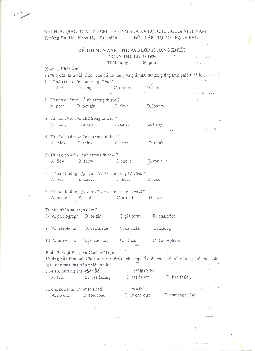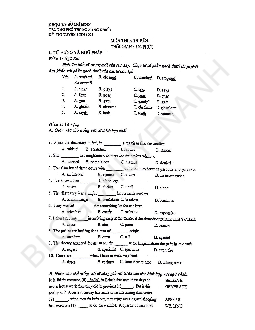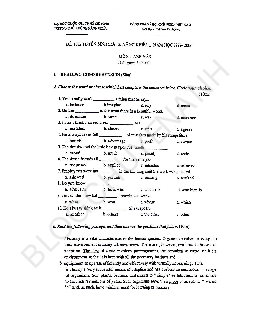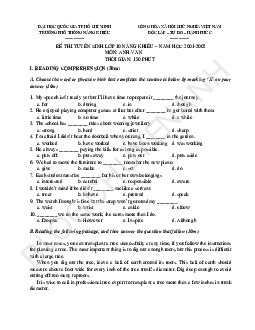




Preview text:
ĐỀ HẢI PHÒNG
Mark letter A, B, C, or D to indicate the sentence that is CLOSEST in meaning to the given one.
Question 1. We’ve never seen such an impressive firework display before.
A. This firework display isn’t as impressive as those we’ve seen.
B. This is one of the most impressive firework displays we’ve ever seen.
C. This is the most impressive firework display we’ve ever seen.
D. This firework display is more impressive than some we’ve ever seen. ● Cấu trúc So sánh nhất ■
Tính từ ngắn: S + V + the + adj + EST …. ■
Tính từ dài: S + V + the MOST + adj ….
Question 2. My uncle is old, but he can play badminton with me every morning.
A. Despite of his old age, my uncle can play badminton with me every morning.
B. Although my uncle is old, but he can play badminton with me every morning,
C. In spite being old, my uncle can play badminton with me every morning.
D. Although my uncle is old, he can play badminton with me every morning. ●
Sau “Although” là một mệnh đề ● Although + S + V, S + V +….
Question 3. Richard no longer rides his motorbike to the countryside at the weekend.
A. Richard used to ride his motorbike to the countryside at the weekend.
B. Richard uses to ride his motorbike to the countryside at the weekend.
C. Richard didn’t often ride his motorbike to the countryside at the weekend.
D. Richard doesn’t use to ride his motorbike to the countryside at the weekend. ● used to V: đã từng
Question 4. Study harder or you won’t pass the exam.
A. Only if you study harder, you will fail the exam.
B. Unless you study harder, you will pass the exam.
C. If you don’t pass the exam, you will have to study harder.
D. If you don’t study harder, you will fail the exam. ●
Câu điều kiện loại 1: [If + thì hiện tại đơn], [will + động từ nguyên mẫu]
Read the following passage and mark letter A, B, C, or D to indicate the correct answer that fits each blank.
Teenagers today live in a very competitive world. It is more important than ever to succeed at
school if they hope to have a chance in the job market afterwards. It’s no wonder that many
young people (5) ______ about letting down their parents, their peers and themselves. To try
to please everyone, they take on too many tasks until it becomes harder and harder to balance
homework assignments, parties, sports activities and relationships. The result is that young
people suffer stress. Everyone knows that caffeine, in the form of coffee or soft drinks keeps
you awake and alert. But caffeine is a drug which can become (6) ______. In the end, like
other drugs. caffeine only leads to more stress. There are better ways to deal with stress.
Physical exercise is a good stress reliever (7) ______ it increases certain chemicals in the
brain which calm you down. It is advisable that you should get enough sleep at night and
spend more time hanging out with your friends or taking part in outdoor activities. Question 5. A. talk B. inform C. think D. worry Question 6. A. negative B. addictive C. reliable D. likable Question 7. A. because B. however C. although D. if 5. ●
Talk (v) about = nói về, bàn đến ●
Inform (v): thông báo, tố cáo ●
Think (v) about : xem xét, suy nghĩ. ●
Worry (v) about sth : lo lắng về việc gì, bận tâm về việc gì 86. ●
Negative /´negətiv/(a): phủ định, phủ nhận, cự tuyệt, phản đối, từ chối; cấm đoán ●
Addictive /əˈdiktiv/ (a): gây nghiện ●
Reliable/rɪˈlaɪəbl/(a): có thể tin tưởng ●
likable /ˈlaɪ.kə.bəl/(a): dễ thương, đáng yêu 7. ● Because: bởi vì ● However: tuy nhiên ● Although: mặc dù ● If: nếu
Mark letter A, B, C, or D to indicate the word whose main stress position is placed
differently from that of the others in each group.
Question 8. A. communicate B. historical C. environment D. Generation
A. /kəˈmjuːnikeit/ B. /his'tɔrikəl/
C. /in'vaiərənmənt/
D. /ˌdʒɛnəˈreɪʃən/
Question 9. A. skyscraper B. fabulous C. negative D. financial A. /'skaɪskreɪpə(r)/ B. /´fæbjuləs/ C. /´negətiv/ D. /fai'næn∫l/
Mark letter A, B, C, or D to indicate the correct word or phrase to complete each of the sentences.
Question 10. The doctor suggested she ______ more exercise to improve her health. A. doing B. does C. do D. did
Câu giả định: S+suggest (that)+S+V0
Question 11. He ______ his homework before he went out with his friends last night. A. will finish B. finishes C. had finished D. is finishing ●
Một hành động xảy ra trước một hành động khác trong quá khứ (dấu hiệu ở đây là “before” ) ●
BEFORE +[ QUÁ KHỨ ĐƠN ], [ QUÁ KHỨ HOÀN THÀNH ]
Question 12. I’m very careful about what to eat, so I only eat fast food ______.
A. over the moon vui sướng đến tột cùng
B. once in a blue moon thỉnh thoảng
C. out of this world tuyệt vời, đầy ấn tượng, không còn lời gì diễn tả
D. the sky’s the limit không có giới hạn đối với bất cứ vấn đề nào như tiền bạc, chi
phí, nguyện vọng hay khát vọng, v.v.
Question 13. Duong and Daisy are talking about Duong’s IELTS test.
- Duong: “I’m taking my IELTS test tomorrow.” - Daisy: “______!” A. Good luck B. Good fortune C. Good outcome D. Good job
Mark letter A, B, C, or D to indicate the word OPPOSITE in meaning to the underlined word.
Question 14. It is very dangerous for children to swim in this river without supervision. A. convenient B. risky C. threatening D. safe ●
dangerous/ˈdeɪndʒərəs/(a): nguy hiểm ● >●
risky /ˈrɪski/(a):Đấy rủi ro, đầy nguy hiểm ●
threatening /ˈθretn-ɪŋ/ (a):Đe doạ, hăm doạ
Mark letter A, B, C, or D to indicate the word whose underlined part is pronounced
differently from that of the others in each group.
Question 15. A. delayed B. explored C. relaxed D. improved A.dɪˈleɪd B. ɪkˈsplɔːrd C. rɪˈlækst D.ɪmˈpruːvd
Question 16. A. section B. sugar C. simplify D. situate A.ˈsekʃən B.ˈʃʊɡɚ C. ˈsɪmpləfaɪ D.ˈsɪtʃueɪt
Read the following passage and mark letter A, B, C, or D to indicate the correct answer to
each of the questions that follow.
Unlike life in the countryside, which is often considered to be simple and traditional, life in
the city is modern and complicated. People from different regions move to cities in the hope
of having a better life for themselves and their children. With plenty of job opportunities
available in the city, the inhabitants work as secretaries, businessmen, teachers, government
officials, factory workers, street vendors or construction workers and so on.
The high cost of living requires city dwellers, especially those with low income, to work
harder or to take part-time jobs. For many people, daily life typically involves getting up in
the early morning to do exercise in public parks, preparing for a hard day of working and
studying, then travelling along crowded boulevards or narrow streets filled with motor
scooters and returning home late at night. They usually live in large houses, high-rise
apartment blocks or even in small rental rooms equipped with modern facilities, like the
Internet, telephone, television, and so on. Industrialization and modernization, as well as
global integration, have big impacts on lifestyle in cities. The most noticeable impact is the
Western style of clothes. The Ao dai, Vietnamese traditional clothes - is no longer regularly
worn in Vietnamese women’s daily life. Instead, jeans, T-shirts and fashionable clothes are widely preferred.
Question 17. What is the main idea of the passage? A. Life in the city
B. Advantages of living in the city
C. Differences between country life and city life
D. Typical life of a city dweller ●
KEY: Unlike life in the countryside, which is often considered to be simple and
traditional, life in the city is modern and complicated.
Question 18. The word “impact” in paragraph 2 is closest in meaning to ______. A. effect B. action C. situation D. force ●
Impact /ˈɪmpækt/ =effect /i'fekt/ (n): tác động, ảnh hưởng ● action (n): hành động ● situation (n): hoàn cảnh ●
Force /fɔːs/ (n): lực lượng, sức mạnh
Question 19. The most important reason why people move to the city is ______. A. to have busy days B. to take part-time jobs C. to look for a better life
D. to look for a complicated life ●
KEY: People from different regions move to cities in the hope of having a better life for themselves and their children ●
For many people, daily life typically involves getting up in the early morning to do
exercise in public parks, preparing for a hard day of working and studying, then
travelling along crowded boulevards or narrow streets filled with motor scooters and returning home late at night
Question 20. According to the passage, city life can offer city dwellers all of the following things EXCEPT ______. A. the Internet
B. friendly communication with neighbors
C. a variety of jobs in different fields D. modern facilities ● KEY :
A,D đúng: They usually live in large houses, high-rise apartment blocks or even in small
rental rooms equipped with modern facilities, like the Internet, telephone, television, and so on
C đúng: With plenty of job opportunities available in the city, the inhabitants work as
secretaries, businessmen, teachers, government officials, factory workers, street vendors or
construction workers and so on.
Question 21. Industrialization and modernization may lead to ______.
A. the disappearance of Western-styled clothes B. changes in lifestyles
C. the fact that women no longer wear Ao dai D. global integration ●
KEY: Industrialization and modernization, as well as global integration, have big impacts on lifestyle in cities
Mark letter A, B, C, or D to indicate the part that is incorrect.
Question 22. Neither John nor his friends is going to the beach today. A. the beach B. nor C. is D. Neither ●
Neither S1nor S2 + động từ chia theo S2: diễn tả ý nghĩa phủ định "không...cũng không".
Question 23. I like watching the plays whom were written by William Shakespeare. A. whom B. watching C. plays D. written ●
Đại từ quan hệ: whom --> which ( thay thế cho “plays”)
Mark letter A, B, C, or D to indicate the correct preposition or phrasal verb that completes each of the sentences.
Question 24. These factors contribute ______ making city life more difficult for its residents. A. with B. to C. in D. on ●
contribute to/towards something: đóng góp cho điều gì
Question 25. The trip to the National Gallery has been ______ until next Friday. A. put off B. looked into C. turned up D. found out ●
put off (phr verb): hoãn, dập tắt ●
look into (phr verb): nhìn vào, xem xét ●
turn up (phr verb): tăng ( âm lượng,...), xuất hiện ●
Find out (phr verb): khám phá ra, tìm ra --- THE END ---




